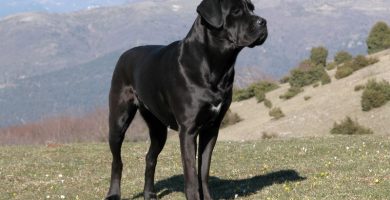Large dogs breeds
The most beautiful big dog breeds
in the World
Big dogs are always worthy of admiration. It comes off as a shock sometimes that such animals can be a man’s best friend, since they can easily be rebellious and refuse to pay attention, but they prefer being calm and dedicating their lives to caring for their human family.
Large-breed dogs have unfavorable genetic characteristics that can be treated if certain care is taken from the beginning of their lives so that diseases do not develop.
A dog fits into the category of “big” when its weight exceeds 25 kilos, (but can even reach 45) and its height 40 cm, being able to measure up to 60 cm.

The world’s most beautiful dog breeds

German Shepherd [2026]

Doberman. 🐾

Black German Shepherd [2026]

Cane Corso [2026]

Bernedoodle.

American Akita [2026]

Alusky.

Weimaraner.

Sloughi [2026]

Airedale Terrier. 🐾

Akbash.

Azawakh [2026]

Alaskan Malamute [2026]

Golden Retriever. 🐾

Saluki [2026]

American Alsatian [2026]

Afghan Hound. 🐾
Advantages of large dogs
Many websites talk about the disadvantages of large dogs, but we will give you a few important advantages that could make you end up deciding on a dog with these characteristics.
They are protectors
If you have valuable stuff in your house, you can be absolutely sure that a large dog will not only take care of you and your family, but also the things that you consider “of value” in your home.
Dogs like Rottweiler, Pit bull, Doberman and the German Shepherd fulfill this function very well, since if someone dares to enter their territories, they won’t remain too calm.
Child friendly
Not everything that comes from big dogs is territoriality. Big dogs are very docile with children; they have a lot of patience and they are quite playful with them. Several races are overprotective with children since they are considered sheep.
They are amazing
Large dogs are simply amazing. A large dog is very striking for any person and any other dog.
They can live indoors
Yes, it may be a bit contradictory, since apartments do not have much space so that a large dog can adapt, however, some large dog breeds, such as greyhounds, can adapt perfectly to an apartment if they are the give the daily walks they require.
They are very observant
Big dogs can look at you for a long time without getting tired. A small dog, on the other hand, will not pat you so much attention, so feel privileged and take advantage of that look that’s filled with love to interact with your pet and teach it some tricks.
Inconveniences of large dogs
The disadvantages of large dogs are not based on their behavior, for the most part, when they are well trained and have been able to socialize. They are extremely affectionate and obedient dogs, but they have certain known health problems that can affect them due to their large size.
Among these problems we have dysplasia, which are malformations in the joints that degenerate the bones and, therefore, make it difficult for the animal to walk.
Unfortunately, large dogs live less than medium, small, or dwarf dogs.
No matter how much they can adapt to being indoors, sometimes the dogs might outgrow the space they live in, thanks to their large size and bulkiness.
Essential care of big dogs
The care of a large dog is similar to that of any dog, varying only some things that ought to be taken into account because of its size, so it can grow healthy and strong.
Since it is a puppy, the dog should be fed with adequate vitamin reinforcements to avoid calcium and mineral deficiencies as an adult, but this should be strictly monitored by a veterinarian, since too much calcium can also cause problems.
You should choose a food type that’s especially recommended for large dogs, besides feeding it the right puppy or adult croquettes.
Keep in mind that the dog will exceed 20 kg as an adult, so its diet will be very demanding; it will certainly make a dent on your pocket.
As for the need for space, you should have at least a medium-sized yard before thinking about adopting a large dog. This is for the comfort and health of it, since a large dog that is not able to adapt to a small space can behave in a neurotic way, destroying furniture and sometimes harming itself.
If you adopt a large dog since it is a puppy, you should take it to the veterinarian to proceed with the necessary vaccinations for its lifetime. It is advisable to give them the first vaccine when they turn one month and one week old.
